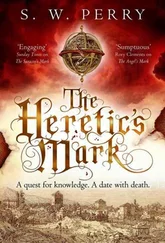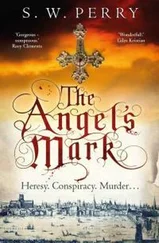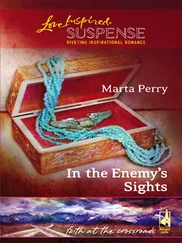‘Captain Yaxley, lower one of your skiffs,’ Nicholas shouts, at last accepting the hand misfortune has dealt him, knowing the card he’s turned is the one with the skeletal horseman on it. ‘It’s me he wants. If you set me adrift, Connell will have his prize. If you don’t, he’ll slaughter every last one of us. I’ve seen what he can do.’
Yaxley seems torn. His eyes dart from Nicholas to the approaching galley and back again. He seems to be gauging whether his conscience can stomach the knowledge of what will happen to Nicholas if he agrees. With a frown of regret, he calls to the main-deck, ‘Lower away the skiff!’
A murmur of approval from one or two of the crew puts the seal upon Nicholas’s growing sense of abandonment. He has never felt so alone in his life, not even after Eleanor’s death. To be set adrift, certain to fall into Connell’s hands, brings fear enough. But to lose all hope of seeing Bianca again – just when it seemed he was free – threatens to turn him from a man into a distraught, howling child. It takes all his will to stay on his feet.
‘God Himself knows I wish there was another way, Dr Shelby,’ Yaxley says, staring at the deck planks, no longer able to look Nicholas in the eye. ‘But I must think of my men.’
‘It’s the right thing to do, Captain Yaxley. There is no fault to be laid at your door.’
‘Do you know how to use a wheel-lock pistol, Dr Shelby?’ Yaxley asks, drawing one from his belt and offering it to Nicholas.
As a lad, Nicholas had often gone wildfowling with his father’s old matchlock in the marshes around Barnthorpe. And in Holland he learned how to use a modern wheel-lock from the Protestant mercenaries he’d served with. He nods.
‘Then take this. All you have to do is cock the dog-head. Don’t get it wet climbing into the skiff.’
Nicholas understands immediately the implication behind Yaxley’s offer. It has nothing whatsoever to do with killing Connell, but everything to do with saving Nicholas from whatever Connell has in store for him.
Taking the pistol, Nicholas imagines the walk from the sterncastle, down the ladder to the main-deck and to the skiff, already being unlashed from its place aft of the mainmast. He does this because he knows that when he embarks upon the short journey for real, his legs will resist. He will have to force himself to move. Seeing the action in his mind might overcome the overwhelming desire to stay rooted to the spot.
He imagines Bianca waiting for him on the main-deck, her hand outstretched, her amber eyes smiling, the faint breeze ruffling those heavy, dark waves of hair. He sees her clearly. Almost as though she’s here, on the Marion . Maybe Ned and the other Banksiders were right – perhaps she really can turn herself into a creature of the air and travel over land and sea to be with him when he has most need of her. He smiles. It will be easier, he thinks, to face what is to come with her beside him. He closes his eyes, the better to see her image.
From somewhere far beyond the lonely centre of his thoughts, he senses – rather than hears – a distant clap of thunder, sharp and brief. He opens his eyes. A moment later he hears the rushing sound of wind like the passage of powerful wings through the air. A tall waterspout bursts out of the ocean barely twenty yards in front of the oncoming corsair galley, hanging like a cloud, before slowly decaying back into the water.
They’ve opened fire upon us, Nicholas thinks. It’s begun.
But he’s faced bombardment by cannon in the Low Countries. At this range, the corsair’s bow-chaser could not have missed. The shot would have smashed into the narrow, high stern of the Marion almost below where he’s standing, sending wicked splinters of timber ripping in all directions. The noise of the cannon’s discharge should have been a hundred times louder.
Was it a misfire? he wonders. Did the powder only partially ignite, hurling the heavy iron ball barely a quarter of the required distance?
Nicholas is still pondering these questions when two more dull explosions reach his ears, followed moments later by more rushing wings, and two more waterspouts rising from the surface of the sea – one astern of the galley, the other on her seaward beam.
It takes him a moment to realize what’s happened: the guns of the Kasar el Bahr have opened fire on the corsair.
But how has the shot reached this far? he wonders, stupefied. The fort on the quayside is all but out of range. Yaxley had told him so when the corsair was first sighted.
And then Robert Cecil decides to have the last word. For what he thinks must be the very first time, Nicholas is actually glad to hear his conversation with Cecil in his head. We send Sultan al-Mansur new matchlock muskets… In payment he sends us saltpetre… so that we can out-charge Spanish cannon…
Yaxley grins like a man making the greatest wager of his life. ‘Looks like you have friends ashore, Dr Shelby. You’d best pray they have their eye in, or we’ll be tinder, too.’
Nicholas cannot stop one short bark of laughter escaping his mouth. He has an image of the taciturn al-Annuri, warned by a lookout somewhere on the Rass Lafaa, stalking the ramparts of the Kasar el Bahr in his gown of white silk, berating the gunners to improve their aim. For he is now certain that these three balls were but ranging shots, to get the gunners properly sighted. And it is fine-quality Moroccan saltpetre that has carried them this far.
The master of the corsair has realized it, too. Astern of the Marion , the galley tries to turn away seawards, to get out of range. The bellowing of the officers reaches Nicholas clearly across a hundred yards of ocean.
But her oarsmen have given their all, in the dash to close on their victim. Muscles that have laboured for the past three-quarters of an hour have no more strength to give. The power that a moment before had made the corsair a predator is now spent. She tries desperately to turn away from what all aboard both vessels know is coming.
There are eight cannon on the ramparts of the Kasar el Bahr, Nicholas recalls. Eight royale cannon – the largest calibre of ordnance. It would take a pair of oxen to move one gun and its carriage. It would take a strong man to lift the forty-two pounds of a single solid iron shot. When the salvo hits, the result will be devastation and death. And at this distance, the Marion is in almost as much danger as the corsair.
Praying that the Moor gunners know their business, Nicholas listens out for the eight detonations, but the sound of the barrage reaches him as one ripple of distant thunder.
For a moment nothing happens. All Nicholas can hear is the creaking of the Marion ’s cordage and the slapping of the calm sea against the hull.
And then they come.
They arrive with the sound of a gale that has sprung up from nowhere, a gale that lasts only as long as it takes for the ear to register its passing.
Three of the shots arrive wide – three pillars of green seawater rising from the surface of the ocean – one of them close enough to the Marion to send a spray of saltwater drifting across her stern.
A fourth lands short, perhaps twenty yards to landward of the galley. But Nicholas sees the blur of the ball as it skips off the water to land squarely amongst the rank of oars, splintering them like twigs, before ploughing on into the hull.
The rest land like rocks hurled against a pane of glass.
One moment the corsair galley is a sleek, almost sensuous animal of the sea, and the next she is torn in two, her entrails spilling out in a cloud of sea mist and debris, oars, planks, rigging – and people. Within two minutes the separate parts of her hull are barely visible above the surface, the single mast with its lateen sail still furled looking like a broken cross on an untended grave.
Читать дальше












